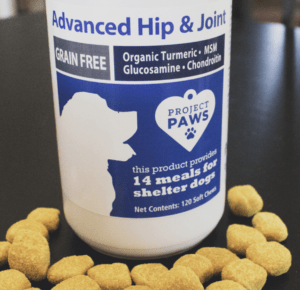 The best time for you to read this article is 5 years ago. The second best time is right now.
The best time for you to read this article is 5 years ago. The second best time is right now.
That’s because the sooner you recognize and react to signs of joint pain in your Rottweiler, the better the quality of life your dog will have.
Maybe you first noticed your dog not running to greet you as you walked in the door after a long day away. Or perhaps it was a whimper while getting up or chasing his favorite ball. This could be a sign of canine arthritis.
Canine arthritis is more common in large breeds like Rottweilers, but it also affects dogs of all sizes and shapes. Arthritis is caused when the smooth covering over bones, known as cartilage, begins to break down. The bones begin to rub at the joint where they come together, causing pain and discomfort because the protective layer either is worn down or no longer exists.
Rottweiler Front & Hind Leg Problems
When this starts to happen, you may notice some of these common signs and symptoms:
- Decreased interest in walking, running, playing
- Whimpering and yelping with movement
- Difficulty rising from a resting position
- Reduced movement in joints or limping
- Falling behind on walks
- Personality changes, such as lethargy or aggression
Once the symptoms of canine arthritis set in, there is no cure and cartilage damage can begin to occur long before you notice any signs. Once you’ve noticed a change, you can help to ease the pain and improve comfort levels. However, long before your dog even begins to show signs, you can take steps to ensure that your companion lives and long, healthy and happy life.
Frequent exercise is great for your dog. That’s a no-brainer. Not only is it excellent for your pet, but it’s also helpful to your personal well being. So go out and enjoy some fresh air…run, walk, throw a ball. You and your companion will value spending time together.
Keeping your dog active not only promotes healthy bones and joints, it will also help your dog maintain a healthy weight. When animals carry excess weight, it causes additional strain on bones and joints, which in turn can cause premature and accelerated reduction of cartilage.
In addition to exercise, a healthy diet also helps your dog maintain a proper weight. Sometimes, however, exercise and diet just aren’t enough. Much like humans that take multivitamins and various supplements, your dog may benefit from taking something to help with general health.
 One of the most common supplements recommended by veterinarians today is glucosamine with chondroitin. Glucosamine, one of the main building blocks of cartilage, promotes lubricant in synovial fluid found in the joints. Supplementing the availability of glucosamine aids the body in the manufacturing and maintenance of cartilage, which may help support healthy joint function.
One of the most common supplements recommended by veterinarians today is glucosamine with chondroitin. Glucosamine, one of the main building blocks of cartilage, promotes lubricant in synovial fluid found in the joints. Supplementing the availability of glucosamine aids the body in the manufacturing and maintenance of cartilage, which may help support healthy joint function.
One of the most advanced and potent supplements on the market today (and the one we use here at iHeartDogs) is the Project Paws ™ Advanced Hip & Joint Soft Chew for Dogs. Using veterinarian quality ingredients, Project Paws has produced a high quality product that’s still reasonably priced. It contains natural anti-inflammatory nutrients such as glucosamine, MSM, chondroitin, and turmeric which help maintain joints, bones, tendons and connective tissue. In addition, each bottle purchase provides 14 healthy meals for shelter dogs!
Remember, your vet is your best resource when it comes to diagnosing possible joint pain problems with your dog. Be sure to discuss any signs of distress you see early and often. In addition, always discuss any new supplementation routine with your vet as well.
To learn more about supplementing your Rottweiler’s health, take the next step. Check out Project Paws and do all that you can to ensure the health of your dog. Making a change today could make a world of difference tomorrow.
Related: Home Remedies for Dog Joint Pain
These statements have not been evaluated by the Food and Drug Administration. This product is not intended to diagnose, treat, cure, or prevent any disease. The information on this website is not intended to replace a one-on-one relationship with a qualified health care professional.
 Toledo, United States.
Toledo, United States.
